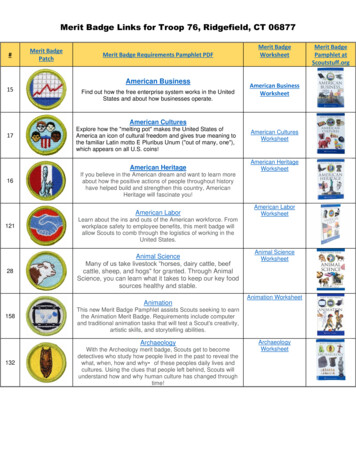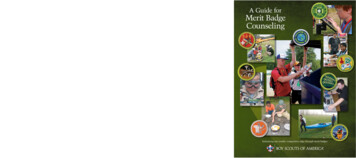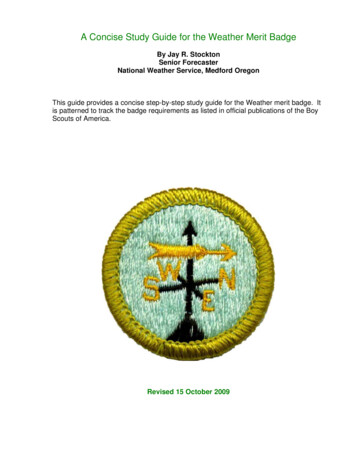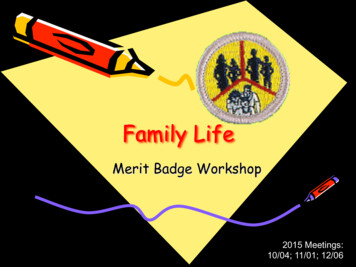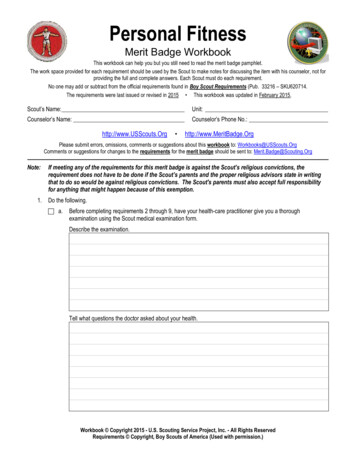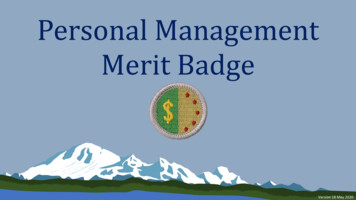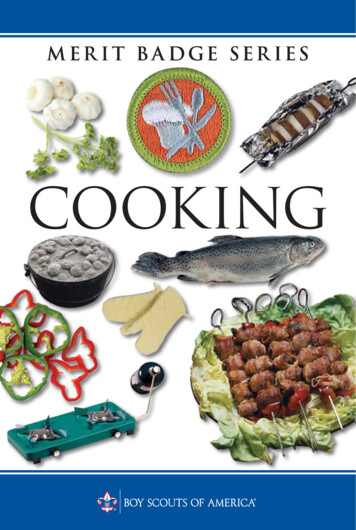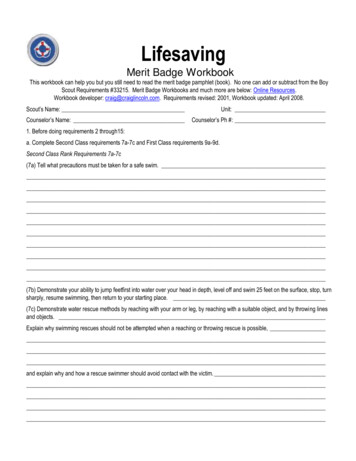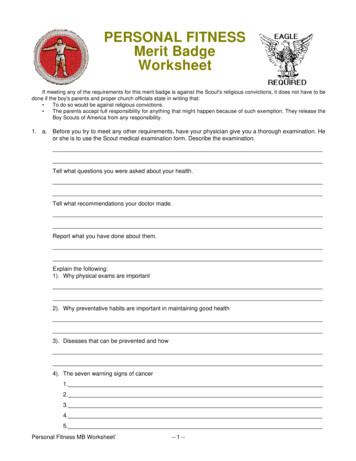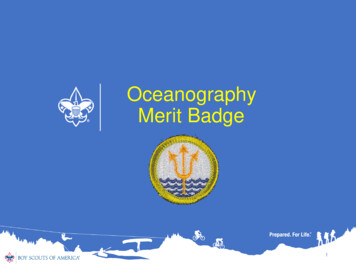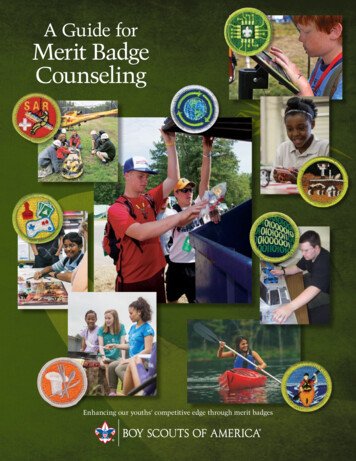
Transcription
A Guide forMerit BadgeCounselingEnhancing our youths’ competitive edge through merit badges
oWelcome tCounselingegdaBitrMeteacher andrves as both aserloseuncoway,A merit badgebadge. In oneork on a meritwtsouselor usesScunascomentorsense, theerrglaaIn.eexaminerts overcome thhe or she is an—helping Scounghiacecoarrawfotying Scoutsthis opportunients and makmirequrente anddifferetheir knowledghurdles of thee subject fromthofsScouts,ctepervasties to seof the deeperique opportuniuneesifyingthofgrecausthe most atexperience. Beselor is one ofuncoedgbaa meritvolunteering asting today.adults in Scourfoesncriepeexlocal councilseck with theirchtodgeuration.rs are stronglyunselor OrientNew counseloerit Badge CoMginedndteatan onestions answerand should plto get their qurseentluevosailablty allowrtunity is unavThis opportunia training oppoIf.rstecessouacScnnteers caby experiencedit badges, voluermnghiacsiteng” by vi tingin time to begidge CounselinBaiterMtoflssentias/advancemenonline “The entationsouts may callstrict so that Scdibyrsloseesting help iscils list counof youths requrbeMost local counmnueTht.a specifican appointmene popularity oftheusthem to makecaberus,lunteerden to the volors needed. Thusually no buber of counsemnuetheneina real be fit.lps determience can beenrecognition henvcoreithpointments atscheduling ap
A Guide for MeritBadge CounselingAdvancement and the Merit Badge PlanAs part of the advancement program of the Boy Scoutsof America, the merit badge plan is one of the mostunique educational tools ever devised. Advancement isthe process by which a Scout progresses from rank torank in Scouting. Everything done to advance and earnhigher ranks in Scouts BSA, including earning meritbadges, is designed to help youth have an exciting andmeaningful experience.The advancement method encourages Scouts toaccomplish a progression of fun and motivationaltasks. Earning these recognitions allows Scouts toexplore many fields, helps them round out theirskills, and perhaps introduces them to subjects thatwill become lifelong interests or rewarding careers.What Is a Merit Badge?The merit badge itself is a simple embroidered patch.The intangible end result of earning it, though, is thatyouth have fun while they gain self-confidence andachieve a goal, sometimes overcoming obstacles andsolving problems.There are more than 135 merit badges a Scoutcan earn. Subjects range from careers and life skills tohobbies, sports, and citizenship. You may ask yourself,“That’s all great, but what do I do, and how do I do it?”What Is My Responsibility?The counselor’s responsibility is to:1. Assist Scouts as they plan the assigned projectsand activities to meet all the requirements.2. Coach them through interviews anddemonstrations on how to complete thevarious requirements.3. Sign off with your approval once you aresatisfied the work has been completed.What Do I Agree to Do?Before work with youth can begin, individualscurrently serving as a merit badge counselor orthose seeking to serve in this role must take BSAYouth Protection training and be registered as amerit badge counselor with the Boy Scouts ofAmerica. Two possible scenarios for the requiredYouth Protection training are discussed here.Current Merit Badge CounselorsIn order to reregister as a merit badge counselor,an adult volunteer’s Youth Protection trainingmust be current within the past 24 months. If thistraining is not current, the volunteer must go tomy.scouting.org, create a user account using theAll merit badge counselors must registerannually with their local council to continuecounseling Scouts.BSA membership ID number, and complete thetraining. The local council service center can provide amembership ID number for volunteers who don’thave access to their membership card.New Merit Badge CounselorsRegistering as a merit badge counselor for the firsttime requires certification in BSA Youth Protectiontraining prior to registration. Similar to the aboveprocedure, new volunteers must go to my.scouting.organd create a user account, which allows them to takethe training. For those who prefer or are requiredto attend in-person, instructor-led Youth Protectiontraining, please contact your local council for trainingdates and locations.After completion, print a copy of the YouthProtection training certificate and attach it to theAdult Application, No. 524-501. Submit these tothe local council along with Merit Badge CounselorInformation, No. 34405, found at guide.Other qualifications for serving in this role are: Must be an individual of good character Must be age 18 or older Must have the skills and education in the subjectsthey want to teach Must have good rapport with Scout-age youth andtheir unit leaders Must be approved by the local councilSpecial qualifications and certifications may berequired by the local council prior to teaching certainmerit badges.These qualifications provide counselors withcredibility because Scouts perceive them as rolemodels. A well-qualified merit badge counselor canenhance a youth’s attention span through effectivecommunication, which leads to better understandingof the subject, productive discussions, and trueinterest. A bond of mutual respect often developswhen a Scout feels confident to offer thoughtsand opinions through meaningful conversationswith a merit badge counselor. Thus, a Scout grows insocial skills and self-reliance as a result of interactingwith an adult who is a qualified counselor.The merit badge counselor agrees to follow therequirements of the recognition, making no deletionsor additions, ensuring the advancement standards arefair and uniform for all Scouts.Counselors are encouraged to become familiarwith all of the topics in “The Merit Badge Program,”section 7 of the Guide to Advancement. Informationfrom this resource can be found online Books are also available for purchase at your Scoutshop or online at www.scoutshop.org.The counselor must be sure the Scout has eitheranother registered adult or the Scout’s parent orlegal guardian present at all instructional sessions.
Step by StepThrough your association with youth members,keep in mind you are assisting unit leaders in theadvancement program. Leaders coach Scouts onthe recognitions they will earn for a particular rankand provide them with the name and phone number of a counselor to contact.Whether a Scout earns the award or not, a volunteeris always interested in the youth’s progress. Themerit badge counselor should feel free to discussthe Scout’s work with the unit leader at any time.of passing the Scout on the requirements, butalso to help the Scout understand the subject.5The Scout, along with a registered adult or theScout’s parent or legal guardian, should makeanother appointment with you when ready toprove an ability to complete the requirements.6This review session might be approached bythe Scout with some apprehension. The Scout isfamiliar with final exams in school and may seethis meeting with you as another suchexperience. You can help by putting the youth atease. Talking rather than grilling or examining—there is a big difference—you can still find outwhat the Scout knows. Express honestenthusiasm for the things the Scout has done, particularly if projects are involved. Your approvalwill give the Scout confidence.7When meeting with you, the Scout should bringthe projects required for completion. If thesecannot be transported, the Scout should presentsatisfactory evidence, such as a photograph ofthe project or adult verification. The unit leadermight, for example, verify that a satisfactorybridge or tower has been built for Pioneering,or that the required meals were prepared forthe Cooking merit badge. Your responsibility,in addition to coaching, is to satisfy yourselfthat the requirements have been met. Questionthe Scout and, if you have any doubts, contactthe adult who signed the statement.8When you are satisfied the Scout has metthe requirements, you list and initial eachcompleted requirement. The blue card is notsigned until all requirements are met.Let’s now review the process of how a volunteerhelps Scouts earn merit badges, beginning with theinitial contact.1The Scout contacts you, probably by phone. Youmay explain what is expected over the phone,or you may want to make an appointment withthe Scout and another registered adult or theScout’s parent or legal guardian to discussexpectations in person. Personal contact willmake earning the badge a better experience forall concerned.2When you work with a Scout, there mustalways be another adult with the Scout.This person can be a registered adult orthe Scout’s parent or legal guardian.3On the first visit, the Scout should bring amerit badge application, known as the “bluecard,” No. 34124, signed by the unit leader. Thislets you know the Scout and the unit leaderhave discussed earning this badge and thatthe leader authorizes the meeting with you.4In your discussion of what is expected, youmay want to start by finding out what the Scoutalready knows. The Scout may already haveworked on some of the requirements beforemeeting with you, but before signing off, it isup to you whether each requirement has beencompleted as written. Spend some time helpingthe Scout learn the remaining requirements, orgive guidance in c ompleting projects. You can setup additional meetings—not only for the purposeYou may work with many Scouts each year asthey earn merit badges. However, you might onlywork with a few. Your contact with these Scoutsis tremendously important. Your influence ismeasured not by the number of Scouts with whomyou work, but by the effect upon the lives of thosewith whom you have an opportunity to work.The Scout does not have to show knowledge of those things beyond the scope of the requirements. Therequirements for each award appear in the current BSA merit badge pamphlet series and in the current-yearScouts BSA Requirements book, which is available at Scout shops and local council service centers. Requirementsalso are posted online at nd-awards/merit-badges.Requirements—No More, No LessThe Scout is expected to meet the requirements asstated—no more and no less. Furthermore, the Scoutis to do exactly what is stated. If it says ‘‘show ordemonstrate,’’ that is what must be done. Just tellingabout it isn’t enough. The same thing holds truefor such words as ‘‘make,’’ ‘‘list,’’ ‘‘in the field,’’ and‘‘collect, identify, and label.’’On the other hand, you cannot require more ofa Scout than stated. You must not, for example, say,‘‘I want to be sure you really know your stuff, soinstead of the 20 items in your collection, you mustcollect 50 to get my signature.’’ You can suggest,encourage, and help the Scout to get 50 things, butyou must not require it.
our Subject?YlleSuoYnCaram materialsYou might wonder, “If the requirementsas stated are the limits, what else is there forme to do other than help the Scout with thespecifics of these requirements?” Actually,you can go far beyond the requirements inyour discussions with him. A Scout probablywill welcome your willingness to share yourknowledge and experience.An activity also can expose a Scout tothe educational requirements of a subject area.You can provide valuable information oncareer possibilities and show the Scout what ismost interesting to you and what is difficult.The final choice—the selection of what theyouth will do in life—is up to them. However,the Scout will appreciate your help in relating meritbadge work with daily life as they attend school, gointo business, or pursue a military career.progconstantly seekScouting unitsto promote youryou would likefor meetings. Ifants, contactct more participtraattodantsubjecattend a unitarea and offer touryoinseradunit lel youth willsubject.’’ Not aluryolel‘‘stogmeetinexcitingbject, so plan ansuethinedstrebe intened to tickleesentation desigpreutin-m1510- oroffer to meetaudience. Then,the fancy of yourho are reallyg with those wafter the meetint-together.for your next geinterested to planFrom the Guide to AdvancementThe Guide to Advancement specifies: Worksheetsand other materials that may be of assistancein earning merit badges are available from avariety of places including unofficial sources onthe internet and even troop libraries. Use of theseaids is permissible as long as the materials canbe correlated with the current requirements thatScouts must fulfill. Completing “worksheets” maysuffice where a requirement calls for something inwriting, but this would not work for a requirementwhere the Scout must discuss, tell, show, ordemonstrate, etc. Note that Scouts shall not berequired to use these learning aids in order tocomplete a merit badge.Where Do You Meet?If the merit badge subject relates to your position orprofession, then your place of work might be the bestplace to meet with Scouts. Hobby-related subjectsusually are handled in your home. Here you willhave the proper materials for use in coaching Scouts.For a few subjects, coaching will happen in the fieldor where s pecial equipment is at hand. Rowing,Rifle Shooting, Swimming, and Astronomy aregood examples. Remember, when meeting with theScout, always have another registered adult or theScout’s parent or legal guardian.How Many at a Time?Frequently the skills of a subject can be taught toseveral Scouts at one time, a real advantage for you.However, completing the requirements must alwaysbe done on an individual basis. A youth may notqualify just by being a member of a group that isinstructed in skills.Scouts must qualify by personally satisfyingtheir merit badge counselor that they can meet allthe requirements. This may be hard to do in a group.When one Scout answers a question, that can’tpossibly prove that all the others know the answer.Then, too, each youth learns at their own pace. NoScout should be held back or pushed ahead by theirassociation with a group.So remember—you can coach more thanone at a time, but participants must demonstrateindividually that they have met the requirements.Some of the merit badge pamphlets are availablein both print and digital editions, available fromwww.scoutshop.org. The digital versions includespecial features such as videos, extra photos, andother supplemental information.Do You Need a Merit Badge Pamphlet?The information in the pamphlet may be familiar toyou, but it will help you to know what the youth hasread. The pamphlets are written for Scout-age youthwith suggestions for projects that interest them.It’s a good idea to obtain the latest printingof the pamphlet on your subject. It will contain thelatest requirements and information. The printingdate can be found on page 2 of each pamphlet.A complete list of merit badge pamphlets isprinted on the inside back cover of each one withthe latest revision date. By checking this list in anycurrent year’s printing, you can find out whetheryour pamphlet has been updated.If you have suggestions for improvements of therequirements or pamphlet content, please email yourcomments to merit.badge@scouting.org.Why VolunteerThe BSA recognizes that the merit badge counselor is the cornerstone to the merit badge program. By offeringtheir time, experience, and knowledge to guide youth in one or more subjects, these volunteers help shape thefuture of our communities. The Boy Scouts of America is proud of its tradition of volunteer service. It does notendorse merit badge opportunities where fees are paid directly to individuals or groups of individuals.
Merit BadgesAmerican BusinessAmerican CulturesAmerican HeritageAmerican LaborAnimal packingBasketryBird ip in theCommunityCitizenship inthe NationCitizenship inthe WorldClimbingCoin CollectingCollectionsCommunicationComposite MaterialsCookingCrime PreventionCyclingDentistryDigital TechnologyDisabilities AwarenessDog lScienceBOY SCOUTS OF AMERICA1325 West Walnut Hill LaneP.O. Box 152079Irving, Texas 75015-2079www.scouting.org 2018 Boy Scouts of AmericaExplorationFamily LifeFarm MechanicsFingerprintingFire SafetyFirst AidFish and WildlifeManagementFishingFly-FishingForestryGame ic ArtsHikingHome RepairsHorsemanshipIndian LoreInsect StudyInventingJournalismKayakingLandscape ArchitectureLawLeatherworkLifesavingMammal StudyMedicineMetalworkMining in SocietyModel Designand BuildingMotorboatingMoviemakingMusicNatureNuclear ScienceOceanographyOrienteeringPaintingPersonal FitnessPersonal ManagementPetsPhotographyPioneeringPlant SciencePlumbingPotteryProgrammingPublic HealthPublic SpeakingPulp and PaperRadioRailroadingReadingReptile andAmphibian StudyRifle pScouting HeritageScuba DivingSculptureSearch and RescueShotgun ShootingSigns, Signals,and CodesSkatingSmall-Boat SailingSnow SportsSoil and WaterConservationSpace ExplorationSportsStamp eaterTraffic SafetyTruck TransportationVeterinary MedicineWater SportsWeatherWeldingWhitewaterWilderness SurvivalWood CarvingWoodwork512-0652018 Printing
experience. You can help by putting the youth at ease. Talking rather than grilling or examining— there is a big difference—you can still find out what the Scout knows. Express honest enthusiasm for the things the Scout has done, particularly if projects ar
